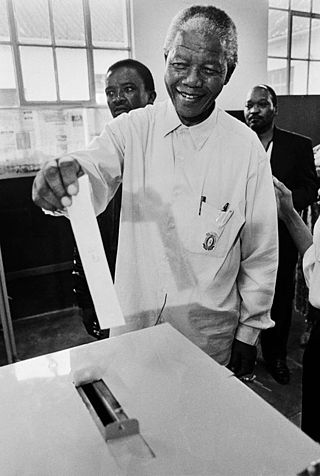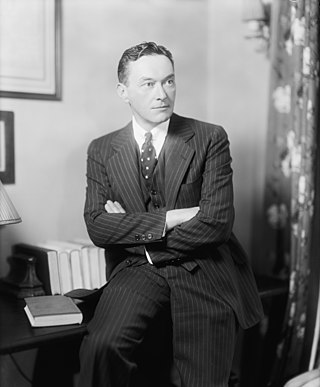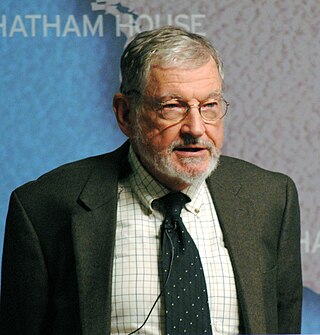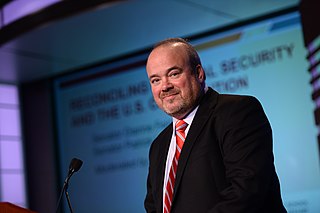Related Research Articles

Democracy is a system of government in which state power is vested in the people or the general population of a state. According to the United Nations, democracy "provides an environment that respects human rights and fundamental freedoms, and in which the freely expressed will of people is exercised."
Oligarchy is a conceptual form of power structure in which power rests with a small number of people. These people may or may not be distinguished by one or several characteristics, such as nobility, fame, wealth, education, or corporate, religious, political, or military control.
A plutocracy or plutarchy is a society that is ruled or controlled by people of great wealth or income. The first known use of the term in English dates from 1631. Unlike most political systems, plutocracy is not rooted in any established political philosophy.
Representative democracy, also known as indirect democracy, is a type of democracy where elected delegates represent a group of people, in contrast to direct democracy. Nearly all modern Western-style democracies function as some type of representative democracy: for example, the United Kingdom, Germany, France, and the United States. Representative democracy places power in the hands of representatives who are elected by the people. Political parties often become central to this form of democracy if electoral systems require or encourage voters to vote for political parties or for candidates associated with political parties. Some political theorists have described representative democracy as polyarchy.

Walter Lippmann was an American writer, reporter, and political commentator. With a career spanning 60 years, he is famous for being among the first to introduce the concept of the Cold War, coining the term "stereotype" in the modern psychological meaning, as well as critiquing media and democracy in his newspaper column and several books, most notably his 1922 Public Opinion.

Benjamin R. Barber was an American political theorist and author, perhaps best known for his 1995 bestseller, Jihad vs. McWorld, and for 2013's If Mayors Ruled the World. His 1984 book of political theory, Strong Democracy, was revised and reissued in 2004. He was an adviser to political leaders including Bill Clinton, Howard Dean, and Muammar Gaddafi. He was a board member of the Gaddafi International Charity and Development Foundation.

The values and ideals of republicanism are foundational in the constitution and history of the United States. As the United States constitution prohibits granting titles of nobility, republicanism in this context does not refer to a political movement to abolish such a social class, as it does in countries such as the UK, Australia, and the Netherlands. Instead, it refers to the core values that citizenry in a republic have, or ought to have.

Seymour Martin Lipset was an American sociologist and political scientist. He was the president of the American Political Science Association. His major work was in the fields of political sociology, trade union organization, social stratification, public opinion, and the sociology of intellectual life. He also wrote extensively about the conditions for democracy in comparative perspective. A socialist in his early life, Lipset later moved to the right, and was considered to be one of the first neoconservatives.
The Ludlow Amendment was a proposed amendment to the Constitution of the United States which called for a national referendum on any declaration of war by Congress, except in cases when the United States had been attacked first. Representative Louis Ludlow (D-Indiana) introduced the amendment several times between 1935 and 1940. Supporters argued that ordinary people, who were called upon to fight and die during wartime, should have a direct vote on their country's involvement in military conflicts.

John E. Mueller is an American political scientist in the field of international relations as well as a scholar of the history of dance. He is recognized for his ideas concerning "the banality of 'ethnic war'" and the theory that major world conflicts are quickly becoming obsolete.
In philosophy, political science and sociology, elite theory is a theory of the State that seeks to describe and explain power relationships in contemporary society. The theory posits that a small minority, consisting of members of the economic elite and policy-planning networks, holds the most power—and that this power is independent of democratic elections.

Gabriel Abraham Almond was an American political scientist best known for his pioneering work on comparative politics, political development, and political culture.
Dilip Parameshwar Gaonkar is a Professor in Rhetoric and Public Culture and the Director of Center for Global Culture and Communication at Northwestern University. He is also Executive Director of the Center for Transcultural Studies, an independent scholarly research network concerned with global issues based in Chicago and New York. Gaonkar was closely associated with the influential journal Public Culture from the early 1990s, serving in various editorial capacities: associate editor (1992-2000), executive editor (2000-2009), and editor (2009-2011).

Benjamin Ginsberg is a libertarian political scientist and professor at Johns Hopkins University who is notable for his criticism of American politics, in which he says that citizens have become "marginalized as political actors" and political parties weakened while state power has grown. His assessment of the futility of voting, along with his notion that the public has an illusion of control over government, has caused controversy. He is a co-author, along with Matthew Crenson, of Downsizing Democracy, 2004, which received critical attention in mainstream newspapers.
Richard Smoke was an American historian and political scientist.

Jane Jebb Mansbridge is an American political scientist. She is the Charles F. Adams Professor of Political Leadership and Democratic Values in the Kennedy School of Government at Harvard University.
Susanne Hoeber Rudolph was an American author, political thinker and educationist. She was a William Benton Distinguished Service Professor Emerita at the University of Chicago and was actively interested in Politics, Political Economy and Political Sociology of South Asia, State Formation, Max Weber and the Politics of Category and Culture. The Government of India, in 2014, honored her, along with her husband, Lloyd I. Rudolph, for their services to literature and education, by bestowing on them the third highest civilian award, the Padma Bhushan.

Suzanne Mettler is an American political scientist and author, known for her research about the way Americans view and respond to the government in their lives, and helping to stimulate the study of American political development.

Lawrence R. Jacobs is an American political scientist and founder and director of the Center for the Study of Politics and Governance (CSPG) at the University of Minnesota. He was appointed the Walter F. and Joan Mondale Chair for Political Studies at the University of Minnesota's Humphrey School of Public Affairs in 2005 and holds the McKnight Presidential Chair. Jacobs has written or edited, alone or collaboratively, 17 books and over 100 scholarly articles in addition to numerous reports and media essays on American democracy, national and Minnesota elections, political communications, health care reform, and economic inequality. His latest book is Democracy Under Fire: Donald Trump and the Breaking of American History. In 2020, he was elected a Fellow of the American Academy of Arts and Sciences.
Vincent Lamont Hutchings is an American political scientist. He is the Hanes Walton Jr. Collegiate Professor of Political Science at the University of Michigan and a Research Professor at the Institute for Social Research. In 2022, Hutchings was elected a Fellow of the National Academy of Sciences.
References
- ↑ "Martin Gilens & Benjamin Page: Political scientists Martin Gilens and Benjamin Page attempt to quantify the relative influence of wealth on policy in their study 'Testing Theories of American Politics'". The Daily Show. April 30, 2014.
- ↑ One can see also the extended interview: part 2 and part 3
- ↑ Gilens, Martin; Page, Benjamin I. (2014-09-01). "Testing Theories of American Politics: Elites, Interest Groups, and Average Citizens" (PDF). Perspectives on Politics. 12 (3): 564–581. doi: 10.1017/S1537592714001595 .
- ↑ "Curriculum Vitae of Benjamin I Page - Northwestern Scholars - SciVal Experts 4.6". northwestern.edu. Archived from the original on 2015-07-10. Retrieved 2015-05-28.
- ↑ "Benjamin I. Page". Northwestern University. Retrieved 5 May 2016.
- ↑ "ANES > About ANES > Previous Board Members". electionstudies.org. Archived from the original on 2015-05-03. Retrieved 2015-05-28.
- ↑ "Past MPSA Officers". mpsanet.org. Archived from the original on 2014-03-08. Retrieved 2015-05-28.